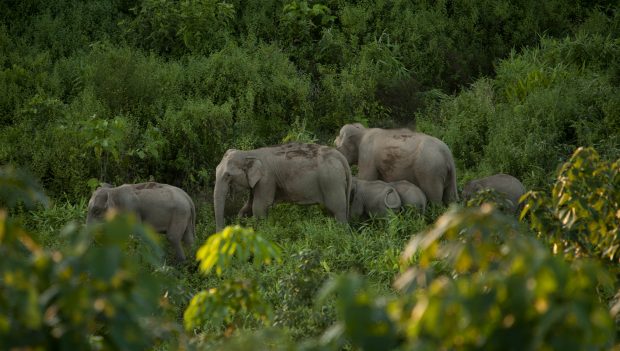
The UK provides a helping hand to iconic mammals
On World Elephant Day (12 August), the UK government is successfully supporting the protection of elephants, helping local livelihoods, ecosystem function and global diversity.
The Asian elephant’s habitat ranges across 13 countries in Asia, but it is an endangered species with less than 40,000 remaining worldwide. In Myanmar, increased deforestation has resulted in wild Asian elephant numbers dropping from 10,000 in the 1960s to under 2,000 by 2004.
A major UK government supported project has helped over 70,000 people and hundreds of elephants live side-by-side peacefully in Myanmar.
UK aid funding from the Darwin Initiative has been critical in establishing a partnership project called ‘Integrating biodiversity & elephants into peace & development’ which has created space for people and elephants to coexist while enhancing local land management.
The coexistence programme is aiming to reach 12,000 families, which will make a difference to lives and livelihoods through education, poverty reduction and providing space for elephants through land-use changes.
Speaking on World Elephant Day (12 August), International Environment Minister Zac Goldsmith said:
World Elephant Day is a chance to celebrate the brilliant individuals and organisations around the globe who are dedicated to protecting this iconic species for future generations.
I am delighted to see the successes of Elephant Family’s project to protect Asian elephants in Myanmar.
The Darwin Initiative is critical in supporting this type of international conservation project, and for ensuring local communities are central to conservation initiatives.
Now in its third year, the project has been successful in facilitating forest and biodiversity protection. Through practical support, over 43,000 local people across 63 villages have been empowered about sustainable land-use management - helping tackle poverty alleviation through supporting the foundation of local livelihoods – through land tenure and ownership.
Belinda Stewart-Cox, OBE, Elephant Family Trustee, said:
Through education, this project has promoted a better understanding of elephants, what causes conflict with people and how best to avoid it.
It’s a highly practical project, aimed at every age group in communities that either do, or may soon experience conflict with elephants. It is also teaching communities how to map their land and manage it more sustainably.
Village representatives, schools and authorities across 190 villages have been trained in how to peacefully co-exist and value elephants – reaching over 12,000 families, and helping safeguard their livelihoods without harming elephants.
We are working with a number of organisations who protect wildlife, such as @elephantfamily.
Through their #elephantprotection project 🐘 they reached over 35,000 people in Myanmar and help people and elephants live peacefully: https://t.co/VTX9ISZybP #WorldElephantDay pic.twitter.com/SHMoPMdQlz
— Defra UK (@DefraGovUK) August 12, 2019
Projects like this are illustrative of the ‘win-win’ approach encouraging sustainable livelihoods whilst conserving some of the world’s iconic and endangered species and landscapes, which benefits us all.
The UK is a global leader on the protection of elephants having introduced one of the world’s toughest ivory sales bans last year.
View our short video on the Darwin Initiative’s project in Myanmar.